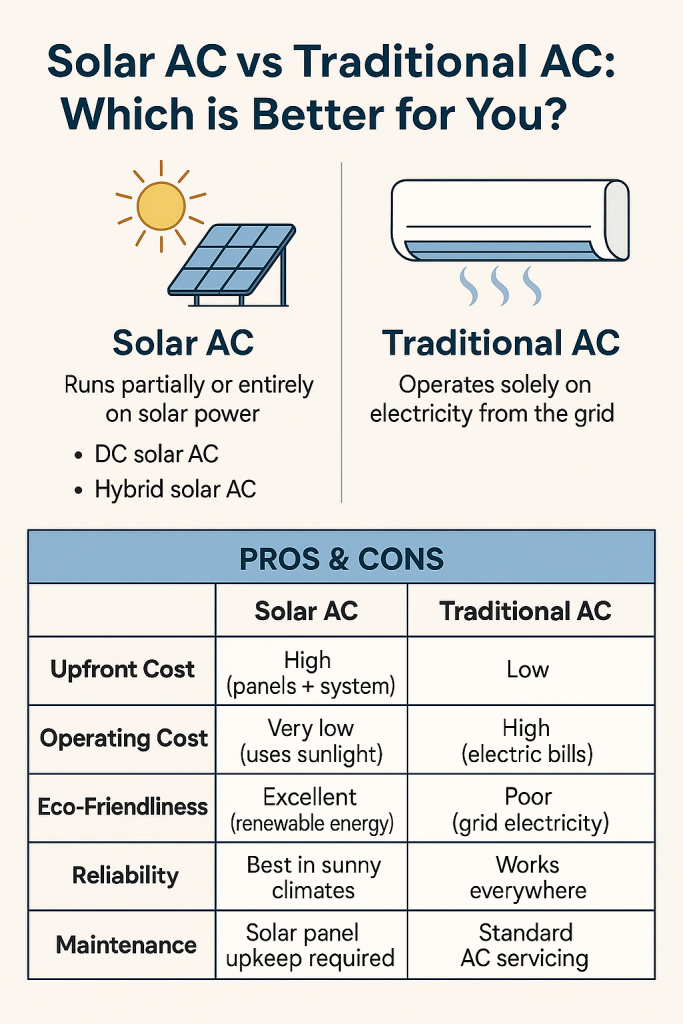As the demand for energy-efficient and eco-friendly cooling solutions rises, many homeowners and businesses are asking: solar AC vs normal AC — which one is better? With rising electricity costs and growing concerns about carbon emissions, choosing the right air conditioning system isn’t just about comfort anymore—it’s also about long-term savings and sustainability.
In this post, we’ll break down everything you need to know about solar-powered air conditioners compared to traditional AC units, so you can make the best decision for your needs.
Key Takeaways
- Solar AC uses solar panels to power the system, reducing electricity bills and carbon footprint.
- Traditional AC is more affordable upfront but relies fully on grid electricity, leading to higher long-term operating costs.
- Solar AC is ideal for sunny regions and eco-conscious homeowners, while traditional AC suits those with budget constraints or limited sunlight.
- Both options have pros and cons—your choice depends on budget, location, energy needs, and sustainability goals.
What Is Solar AC vs Traditional AC?
Solar AC
A solar air conditioner runs partially or fully on solar energy. It can be:
- DC Solar AC: Runs directly on solar panels (ideal for off-grid).
- Hybrid Solar AC: Switches between solar and grid power as needed.
Explore Solar Air Conditioner Series for energy-saving models.
Traditional AC
A normal AC relies 100% on electricity from the grid. Common types include split ACs, central ACs, and window units. While widely available and affordable, they contribute to higher energy bills and greenhouse gas emissions.
Why Does This Matter?
Air conditioning accounts for 10–15% of household electricity use worldwide, and in hot climates, this number is much higher. With climate change pushing temperatures upward, cooling demand is growing. Choosing the right AC system can help:
- Lower monthly utility bills
- Reduce dependence on fossil fuels
- Improve indoor comfort without financial stress
Who Benefits From Each Option?
- Solar AC Users
- Homeowners in sunny areas
- Businesses with large rooftops for solar panels
- Environmentally conscious consumers
- Traditional AC Users
- Renters or homeowners with limited roof space
- People in regions with frequent cloudy/rainy weather
- Budget-conscious buyers prioritizing low upfront cost
Pros & Cons: Solar AC vs Normal AC
| Feature | Solar AC | Traditional AC |
|---|---|---|
| Upfront Cost | High (panels + system) | Low |
| Operating Cost | Very low (uses sunlight) | High (electric bills) |
| Eco-Friendliness | Excellent (renewable energy) | Poor (grid electricity) |
| Reliability | Best in sunny climates | Works everywhere |
| Maintenance | Solar panel upkeep required | Standard AC servicing |
How to Choose Between Solar AC and Normal AC
Step 1: Assess Your Location
- Sunny regions (South Asia, Middle East, Southern US): Solar AC shines.
- Cloudy/rainy regions: Traditional AC may be more reliable.
Step 2: Consider Budget & ROI
- Solar AC costs more upfront but pays for itself in 5–8 years through savings.
- Traditional AC is cheaper initially but leads to higher bills over time.
Step 3: Check Your Sustainability Goals
- If reducing carbon footprint is a priority, solar powered AC is a clear winner.
- If cost is the only factor, traditional AC may suffice.

Impact on Customers, Industry, and Environment
- Customers: Solar AC helps slash energy bills long term.
- HVAC Industry: Growing shift toward hybrid and green technologies.
- Environment: Solar-powered cooling significantly cuts greenhouse gas emissions, aligning with global climate goals.
What to Look for in an AC Decision
When choosing between solar AC vs normal AC, consider:
- Energy Efficiency Rating (EER/SEER)
- Warranty & service support
- Hybrid options (to avoid downtime on cloudy days)
- Scalability (can you add more solar panels later?)
- Incentives & rebates (many governments subsidize solar energy)
Conclusion
The debate of solar AC vs normal AC boils down to your priorities:
- If you value sustainability, long-term savings, and energy independence, solar AC is worth the investment.
- If you need an affordable, widely available option, traditional AC still delivers reliable cooling.
For most homeowners in sunny regions, a hybrid solar AC offers the best balance of cost, reliability, and eco-friendliness.
FAQs
1. Is solar AC better than normal AC?
Yes, if you live in a sunny region and want to cut long-term energy costs. But traditional AC may be more practical in cloudy areas.
2. How much does solar AC cost compared to normal AC?
Solar AC can cost 2–3 times more upfront but saves significantly on monthly electricity bills.
3. Can solar AC run at night?
Yes, if paired with batteries or hybrid systems that switch to grid power.
4. Do solar ACs work in cloudy weather?
Yes, but efficiency drops. Hybrid systems solve this issue.
6. Are there government incentives for solar AC?
In many countries, tax credits or rebates are available for solar installations.



